- Home
- Joel C. Rosenberg
The Twelfth Imam Page 22
The Twelfth Imam Read online
Page 22
How many Muslims believed the end of the world was at hand? he wondered. How many Iranians did? How many Iranians at the highest levels of the regime believed it?
As David pondered that, it occurred to him that there was a growing sense in cultures around the world that the end of days just might be approaching and that with it was coming a final, momentous clash between good and evil. Preachers and rabbis and imams and even environmentalists were saying with increasing frequency and intensity that “the end is near.” But rather than laugh them all off as nuts, people seemed to be eating up the message. Even Hollywood was cashing in, making millions from apocalyptic movies.
What did it all mean? David had no idea. But in the privacy of his thoughts, he, too, feared the world was speeding recklessly toward the edge of the cliff. The longer he worked for the Central Intelligence Agency and the more classified information he gained access to, the deeper his fears became. And if Iran got the Bomb, or—God forbid—if Osama bin Laden did, something told him the implications would be far worse than even Langley’s most dire predictions.
Which prompted another thought.
He had always told himself that he had joined the CIA to destroy radical Islam, to avenge the death of nearly three thousand Americans on 9/11, to avenge the death of Claire Harper, and perhaps even to show Marseille Harper how much he loved her. It was all true, but it had become more than that. He had come to fear that the events of September 11, 2001, would pale in comparison to the death and destruction that would be wrought if the world’s most dangerous extremists gained possession of the world’s most dangerous weapons. He had to stop them. He had to try, anyway. Most Americans had no idea the threats their country faced. But he did, and he’d never be able to live with himself if he didn’t do everything in his power to save people’s lives.
David turned on the lights. He was covered with sweat. What he really needed was a good, stiff drink. But this was Tehran. The minibars weren’t exactly stocked with Smirnoff and Jack Daniel’s. Come to think of it, he realized, his room didn’t even have a minibar.
He got up, went into the bathroom, and opened a bottle of water. Then he turned on the shower—good and cold—stripped down, and stepped behind the plastic curtain.
As the water poured down his body, he half expected to be struck by lightning or felled by a massive heart attack. End of the world or not, if there was a God, and if it really was the God of the Qur’an, then he knew he was doomed. In college, David had faithfully attended a Shia mosque in Munich, studied the Qur’an, and become a part of the Muslim community, just as Zalinsky had required. He knew what he was supposed to believe. But he didn’t. Plain and simple.
Shivering, David finally turned off the ice-cold water, wiped himself down, wrapped up in a towel, and stepped in front of the mirror. His glasses had been replaced by contact lenses years ago. His braces were long gone. He was taller than his brothers now, taller even than his father. But all that was superficial. Who was he now, really? What was he becoming? Where was he going?
He left the bathroom and paced around the hotel room. He pulled the drapes back a bit and stared out at the quiet streets of Tehran. He wondered what Marseille was doing at that moment, what she was thinking. Was she upset that he had never responded? Was she angry with him? He hoped not. He wished he could call her right then. She’d had enough heartache in her life. He didn’t want to be the cause of any more.
He thought back to the note she’d sent him and reread a particular line in his mind’s eye.
I wondered if you might like to get a cup of coffee together, or something. . . . It’s been a long time . . . and there are things to say.
He wondered what she meant by “there are things to say.” It was an interesting turn of phrase—old-fashioned, almost. She was right, of course, but it didn’t sound like a person casually suggesting coffee simply to catch up on old times. She had specific things to tell him or ask him. But what? As he thought about it further, he realized she hadn’t just used the phrase once. She had actually used it twice—or at least a variation of it.
If you can’t get together, or if you don’t want to, I’ll certainly understand. And I’m sorry for rambling on like this. I didn’t mean to. I just meant to say . . . it would be good to catch up and tell you things I should have said earlier, if you’re okay with that.
So she didn’t have questions for him. At least, that’s not what she was signaling. She had things on her heart she wanted—needed—to say directly to him, in person, not on paper. Why would he not be “okay with that”?
Was she talking about why she’d never written back to him? Maybe there was more to why she and her father had moved to Portland. Or was it something to do with religion? She had told him that her friend’s wedding was going to be held at an “awesome” church. She had even invited him to go with her to the church while she was in town, even though she must know he was an avowed agnostic. Maybe she thought he had changed. It sounded like she had. Was that what this was all about?
Trying to clear his head, David turned on the television and started flipping through the channels. State-run news. Football (soccer). More state-run news. More football. Some cleric teaching from the Qur’an. Some lame black-and-white movie from the 1950s. It was all mind-numbingly boring. He turned off the set and lay back on the bed, staring at the ceiling fan whirring above him.
He let his mind drift back to the little A-frame in Canada. All these years later, he could still feel her lips on his, the warmth of her body against his own. She’d been so nervous and yet so trusting, and she had held him so tightly. And what had she asked him? Whether he believed in God. Whether he believed in Jesus. Whether he thought God was real and loving and answered prayer. He hadn’t known what to say back then. And it depressed him to think he still didn’t. He had no answers, and given the risks he was taking—and the very real and growing possibility that he could be captured and killed for being an American spy in Tehran—the thought of not knowing the truth about God and the afterlife terrified him.
If there was one thing he knew from studying the Qur’an, it was that Islam was a works-based religion. If his good works didn’t outweigh his bad works when he died, then he was damned for eternity.
He recalled reading Sura 23:102-104 in college. The text was crystal clear in his memory: “Those whose scales of good deeds are heavy, they are prosperous, while those whose scales are light, they will be those who have ruined their own selves, in hell abiding. The fire will scorch their faces, their lips being displaced and their jaws protruding.”
The problem, as David saw it, was that Islam provided no way for a Muslim to assess how he or she was doing throughout his or her life. There was no Web site to log on to and check daily scores. There were no quarterly report cards. There were no annual performance reviews. How, then, could anyone know for certain whether he would spend eternity in paradise or in punishment? How could anyone find the assurance of salvation that every thoughtful soul seeks before death?
The brutal truth was, no one could. That was what terrified David most. He had lied to almost everyone he had ever known. He had been unkind to people he loved. He had been ungrateful to people who had treated him well. He didn’t stay in touch with his parents. He didn’t stay in touch with his brothers. His professional life required that he be a liar and, more recently, a hypocrite—playing the part of a religious man but denying Islam’s truth and power. And then there were his secret sins, the ones he dared not confess. The more he cataloged his bad deeds, the worse he felt, and he had no idea where to turn.
No wonder devout Muslims took the verses in the Qur’an about waging jihad so seriously. Why shouldn’t they? To disregard the command to jihad would be to disobey, and such disobedience could tip the scales of justice against them in the final reckoning.
Which brought him to martyrdom.
The mullahs and ayatollahs taught that the only true assurance or secure promise of eternal salvation for a Muslim was to die as a marty
r, often as a suicide bomber, in the cause of jihad. Osama bin Laden himself had once said, “The call to jihad in God’s name . . . leads to eternal life in the end and is relief from your earthly chains.”
There was no way that was true, David was certain. But what was?
50
Shahrak-e Gharb, Iran
Little Roya was turning ten years old.
And she knew exactly what she wanted. For weeks, she had been writing her parents little notes to remind them, strategically placing them in her father’s briefcase, by her mother’s sewing basket, on their napkins at dinner, or in other places where they would invariably find them, read them, and consider her request one more time. She pleaded with them not to give her candy or a doll or a book or a pretty new scarf. All she wanted was one thing, and she’d been begging for it for each of the past three years. She wanted them to take her to the Jamkaran Mosque so she could write down her prayer, drop it into the well with all the others, and make her request of the Twelfth Imam.
Growing up in a well-to-do suburb of Tehran, Roya had almost everything she wanted. Her father was a senior translator for the Foreign Ministry and occasionally traveled abroad with high-ranking Iranian officials. Her mother was a renowned botanist in the biology department at Tehran University, who, with Roya’s eager help, was cultivating the most gorgeous rose garden in their backyard. Her grandparents were successful in business. She was even distantly related to Ayatollah Hosseini and had met him twice. But while Roya was sweet and devout and brilliant in every respect, she had also been mute from birth. She longed to be able to talk with her parents and sing with her friends. She hated to be thought of as “special.” She wanted to be normal. Was that too much to ask?
Maybe it was.
The Jamkaran Mosque, located about six kilometers outside the holy city of Qom, was at least a three-hour car ride each way, not counting however much time they might spend there in prayer. Taking a day off from work would be an enormous imposition on her parents. But Roya simply couldn’t help it. She’d seen on TV a news story about the well, and it had completely captured her imagination. One man interviewed said, “If you ask in the right way, your prayers will be answered.” Another said, “I don’t come here just to pray for myself. I also ask the Mahdi to take care of my family and their needs.”
Roya was particularly struck by an interview with a little boy who had brought his flashlight, convinced that the Twelfth Imam was hiding at the bottom of the well reading all the prayer requests people were dropping down there. “I was looking into the well with my flashlight, hoping to see the Mahdi,” the boy had said. “But not tonight.”
The reporter noted that according to Shia tradition, “if you come to Jamkaran forty weeks in a row, you will see the Mahdi.”
The morning of her birthday, Roya awoke early. The house was quiet—her parents must not yet be awake.
Suddenly Roya heard footsteps in the hall outside her bedroom. Maybe her parents were up after all. She glanced at the clock on her nightstand. It wasn’t quite six in the morning. Then the door opened slowly, and her parents came in and sat on her bed.
“Happy birthday, sweetheart,” her father whispered. “We’re leaving in five minutes. Think you can be ready by then?”
Ecstatic, Roya jumped up and threw her arms around her father, then her mother, kissing them both profusely.
The trip was more special than even she had pictured. They didn’t drive as a family to Qom. They flew—first-class. They didn’t race to the well and then back to the airport. They stayed overnight in a five-star hotel and went out for a fancy dinner. They took a thousand pictures of everything they saw and did, from Roya scribbling her prayer request on special stationery her mother had given her that day as a gift, to Roya pointing her own flashlight—another unexpected gift from her father—down into the well.
But as special as all that was, it did not prepare the little girl for what happened when they all got home the following night. Roya was upstairs brushing her teeth and getting ready for bed when she heard a knock at the door. It seemed a little late for company, and Roya was surprised when she overheard her father talking to a man and then inviting him to come inside. She didn’t recognize the man’s voice, and when she peeked downstairs, she could see only the back of his head, but she was fairly certain she had never seen him before.
“It would be an honor if you would allow me to pray a blessing on you and your home,” said the stranger, who was dressed as a cleric or a mullah.
Roya, hiding on the stairs and careful to remain unseen, heard her father agree, and the man prayed a very beautiful prayer, asking Allah to bring “peace and tranquility to this lovely home” and “bless all who live here now and all who will live here in the future, so long as they submit to you, O Lord.”
Not wanting to risk being discovered by her parents, Roya was about to go back to her room and climb into bed when she heard the man ask if he could see their little girl and pray for her as well. Roya froze. How did the man know about her?
“I’m sorry. How do you know we have a daughter?” her father asked. “There are no pictures of her in this room. I haven’t mentioned her, and we have never met.”
“Do not fear or be alarmed in any way,” the stranger said. “The answer is simple. Allah has sent me to your home to heal little Roya.”
Roya’s heart started racing, but she could see her father tense.
“How do you know her name?”
“I know all about your daughter,” the stranger said. “She was born with aphonia, preventing her ability to speak. In her case, it was caused by a genetic disorder that damaged her vocal cords. She has been to nine doctors in eight years and has had three surgeries. None of them have worked.”
Astonished, Roya waited for her father to respond, but he didn’t. Or couldn’t. The room was silent for a moment, and then the man continued.
“Yesterday you flew to Qom. You went to the Jamkaran Mosque, and together you wrote out a prayer and tossed it into the well.”
“Who are you?” her father finally blurted out. “And how do you know all this?”
“Roya asked for the Mahdi to heal her.”
“Yes . . . yes, she did, but . . .”
“Her request has been granted. That is why I am here.”
Roya feared that her father might throw the man out of the house. But what if the stranger really had been sent from Allah? What if he was . . . ?
Suddenly she found herself walking down the stairs and into the living room, where she stood by her father and held his hand.
She pointed at the stranger, in awe of his striking good looks and piercing black eyes. She now thought she recognized him from a dream she’d had a few weeks before.
The man began praying in a language Roya didn’t know and had never heard before. When he stopped, Roya fell backward and began writhing on the floor. Her mother screamed. Her father was at her side but could not help her. Her body shook wildly. She felt like she was choking. For a moment she thought she was losing consciousness. Then the stranger began praying again, still in some unintelligible language. Immediately her convulsions ceased.
She opened her eyes again and stared at the ceiling. Her parents’ faces were pale. She saw the man come over and kneel beside her. He took her by the hand, pulling her gently to her feet. She felt a cold chill ripple through her body, and then to everyone’s astonishment she began to speak. Then she began to sing. Soon she began to shout praises to Allah. She was delirious with happiness. She spun and twirled and hugged her parents and wept with joy.
And then they all turned to thank the stranger, but he was gone.
51
Tehran, Iran
Five full days had gone by, and still nothing had happened.
Beside himself with frustration, David got up early. He showered but once again skipped shaving. He was trying to grow a beard to fit in better, and it was coming in quite well now. He headed to the mosque for morning prayer.
There was a message waiting for him at the front desk when he got back to the hotel. He took it upstairs, closed himself in his room, and opened the envelope, letting out a sigh of relief. It was an invitation for a dinner party at the home of Daryush Rashidi, the president of Iran Telecom. The note said a car would pick him up in front of his hotel at precisely seven o’clock that night, and a phone number was provided for his response. David immediately entered the number into his mobile directory and called to confirm his attendance. He just hoped the NSA system would enable Zalinsky and Fischer to compile a list of the others who would be there.
Fischer.
He hoped Zalinsky had gone easy on her. None of this had actually been her fault. It had been Zalinsky’s decision—not hers—to make her project manager and send her to Tehran. Doing so had put their entire mission in jeopardy. But all things considered, Eva had handled things quite well. David barely knew her, but what he knew, he liked. She was smart. She was tough. She was loyal to the Agency. Her Farsi was impeccable. She was not Marseille, but truth be told, she looked rather fetching in a headscarf.
At seven, a black sedan pulled up in front of the Simorgh Hotel. David got in and was driven to a swanky apartment building in an upscale section of Tehran, where he was led by a security guard to a suite on the top floor. But it wasn’t the kind of affair David had pictured. There were no servants in tuxedos bringing in trays of food. There were no flower centerpieces or music. There were no other guests at all. Just Daryush Rashidi and Abdol Esfahani.
“Mr. Tabrizi, welcome,” the tall, graying CEO said, shaking David’s hand. “It is an honor to finally meet you. Abdol has told me good things about you.”
“Please, Mr. Rashidi, call me Reza, and the honor is mine,” David replied, surprised and relieved. “You are most kind to meet with me at all given the events of the last days, let alone inviting me to your home. Thank you—both of you—very much. Your hospitality is most gracious.”

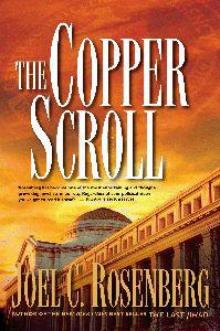 The Copper Scroll
The Copper Scroll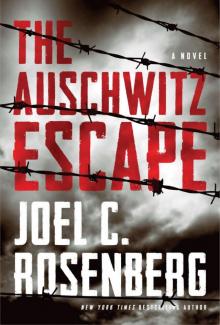 The Auschwitz Escape
The Auschwitz Escape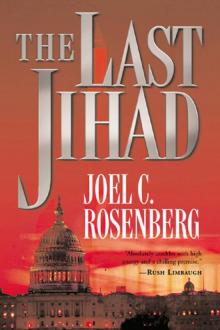 The Last Jihad
The Last Jihad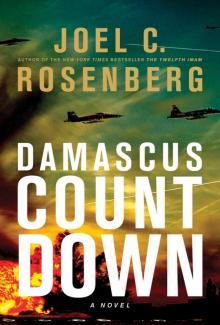 Damascus Countdown
Damascus Countdown The Persian Gamble
The Persian Gamble The Jerusalem Assassin
The Jerusalem Assassin Dead Heat
Dead Heat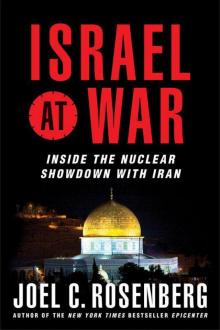 Israel at War: Inside the Nuclear Showdown With Iran
Israel at War: Inside the Nuclear Showdown With Iran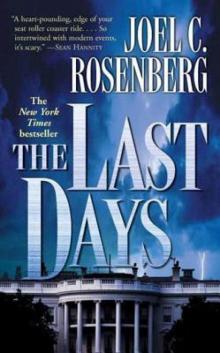 The Last Days
The Last Days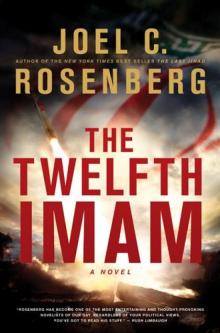 The Twelfth Imam
The Twelfth Imam Epicenter 2.0
Epicenter 2.0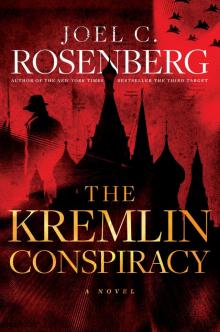 The Kremlin Conspiracy
The Kremlin Conspiracy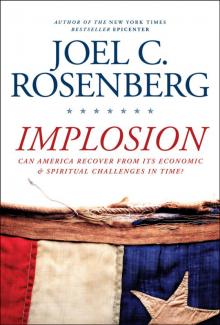 Implosion: Can America Recover From Its Economic and Spiritual Challenges in Time?
Implosion: Can America Recover From Its Economic and Spiritual Challenges in Time?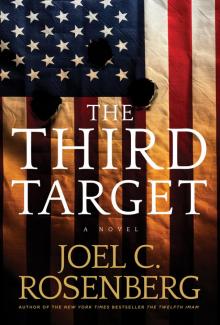 The Third Target: A J. B. Collins Novel
The Third Target: A J. B. Collins Novel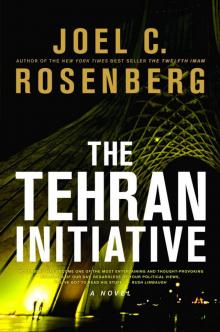 The Tehran Initiative
The Tehran Initiative Inside the Revolution
Inside the Revolution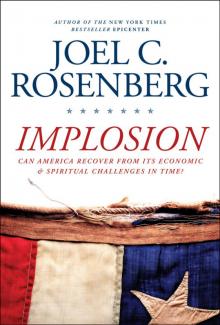 Implosion
Implosion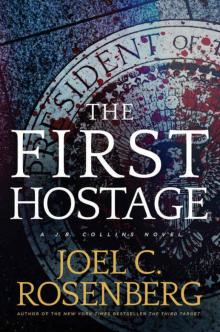 The First Hostage: A J. B. Collins Novel
The First Hostage: A J. B. Collins Novel